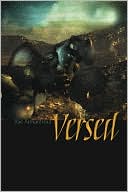

 |

|

The average rating for Versed based on 2 reviews is 3 stars.
Review # 1 was written on 2016-08-21 00:00:00 Herb Pluemer Herb PluemerIt won the Pulitzer, the National Book Critics Circle, and was a finalist for the National Book, but I have to admit that I am not the ideal audience for Versed. It is what they call "language poetry", and I have never been much of a fan. Still, of the little "language" poetry I have encountered, Armantrout is among the best. "Language" poetry'emerging in the '70's'set itself in opposition to the fashionable confessional poetry of the day (Lowell, Berryman, Plath, Sexton)--great stuff that later degenerated into the typical "workshop" poem'by de-emphasizing the emotional utterance of the writer and emphasizing the intellectual act of the reader, presenting him with a fragmentary (often metonymic) language artifacts and inviting the reader's interpretation. It downplays the personal and the lyric in favor of the analytic and the precise; often, it begins to question the permanency--the very existence'of the human personality, of time itself. At worst, poetry like this is a dry collection of philosophical loops; at best, it is something austere and Olympian, like Zukovsky's Z or the more abstract lyrics of W.C. Williams. Rae Armantrout is a seriously playful poet, intent on exploring the nature of language and the speaker of language, their relation to each other and the external world. I find many of her poems baffling, but at best they are gnomic and illuminating, like a sentence of Wittgenstein's or a Zen koan. In this book, her exploration is heightened in its intensity and significance because she has been diagnosed with cancer, and the nature of the cell that creates and uncreates also becomes an object of meditation. Her cancer makes the poem more of a narrative, providing added interest for old school confessional poetry fans like me. The following are two poems taken from "Dark Matter," the second and last section of the book, the one that deals elliptically with Armantrout's cancer: AROUND Time is pleased to draw itself out permit itself pendulous loops, to allow them meaning, this meaning, as it goes along * Chuck and I are pleased to have found a spot where my ashes can be scattered. It looks like a construction site now but it's adjacent to a breathtaking, rocky coast. Chuck sees places where he might snorkel. We're being shown through by a sort of realtor. We're interested but can't get her to fix the price. * "The future is all around us" It's a place, anyplace where we don't exist. PASS Single cells become like-minded, forming a consensus or quorum Bioluminescence and virulence are two ways we describe the feeling they share then. With effort, humans can approach this condition. "Synchronized swimming has afforded me a wonderful life," says one informant. Why not? I too would like to exert power over time, to pass it, aggressively, dramatically, and forget all about it until even the meaning of the word "pass" gets lost in a rosy glow. |
Review # 2 was written on 2010-04-28 00:00:00 Susan De George Susan De GeorgeI don't despise it, but it does make me hate poetry. Everyone around me hates poetry, and I'm always defending it. Then this comes along, winning both Pulitzer and NBCC Award, and I want to go have a beer with dockworkers (I don't know any dockworkers) and talk about sports. I would describe it as minimalist non sequitur--fragments of everyday speech, keywords from critical theory and contemporary science, pop culture winks, ordinary (as if overheard) phrases in quotation marks, and some spillage of private, unreachable stuff from the author's personal life, all of it presented in little bundles that look deceptively (enticingly) Asian from a distance, three bundles or so to a poem. The author is obviously intelligent, and the book jacket mentions her "signature wit," though I think we may have to take that in a special, academic sense that has nothing to do with funny. Somewhere along the way poetry became a mode of communication in which the desire to communicate, found to be embarrassing, was eradicated. If Modernism was that explosion, this is its long-settled dust. I'm actually depressed tonight picturing a poetry establishment that looks up long enough from grading papers to acclaim this book so unanimously and throw big prizes at it. I feel like a Martian. A dockworker Martian with a six pack and a big telescope. --- [Next day.:] Feeling better, thanks. I recommend "Previews" on p. 88. |
CAN'T FIND WHAT YOU'RE LOOKING FOR? CLICK HERE!!!